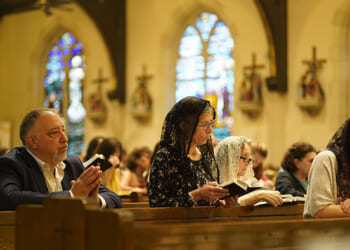Marjorie Rawlings’ The Yearling was America’s best-selling novel in 1938, selling over 250,000 copies and winning the Pulitzer Prize for fiction a year later. While unfortunately I never read it as a kid, I recently had the opportunity to do so while teaching 6th Grade Literature at Ambleside School in McLean, VA. Amidst the Easter season, I’m struck by an idea from the book and its connection to our relationship with the Risen Christ.
A heart-wrenching coming-of-age story set in rural Florida during the late 1800s, the book explores the life of a young boy, Jody Baxter, and the bond he forms with a young fawn he raises. At the beginning of chapter nine, Jody returns home from visiting the neighbors on a clear and luminous April morning. He has trod this path often, through woods and fields. When he comes to a familiar clearing, the text states, “It was strange, Jody thought, whenever he had been away from the clearing, and came home again, he noticed things that he had never noticed before, but that had been there all the time.”
When it comes to familiar places or experiences, why and how can we suddenly notice things that we never noticed before, but that had always been there?
This “noticing” anew, a kind of awakened attentiveness, happens when we live by the Spirit of the Risen Christ. When left to ourselves and the devices of our own wills, we can be blinded to the hidden gems of life that God wants us to see. We aim too low, hitting the worldly and missing the Divine mark. In fact, the Greek word for sin, hamartia, means to “miss the mark.”
Consider the disciples after Christ’s Crucifixion. After witnessing the horror of that day, the disciples cowered in fear, trodding through the depths of despair. All their hopes, dreams, and expectations for what they thought Jesus should do had been completely shattered. They were terrified by what the authorities might do to them, perhaps even carry out the same type of death Our Lord endured. So on multiple occasions, they locked themselves behind closed doors. And yet Jesus appeared to them even while the doors were locked tight. Fortunately for them and us, the Risen Christ unlocks the doors of our hearts so we may be able to see anew.
After His Resurrection, the disciples returned to the rhythms and routines of their lives: their familiar trades, with familiar people in familiar places. They simply returned to what they knew. When Christ appeared to them, they didn’t recognize Him at first, but it was through a miracle that they were able to see. He often works that way, coming to us in miraculous ways mediated through people, places, and things common to our experience.
It is often amidst conditions that invite us or even require us to let go of our expectations and efforts when He does great things. Recall from John 21 when the disciples had been fishing all night and caught nothing. But when they encountered the Risen Lord—who at first they did not recognize—He told them to do what they had unsuccessfully done all night, and they caught a seemingly unbelievable amount of fish. And with an exclamation point to the miraculous catch, their net miraculously didn’t break.
In the same way, when we allow the Lord to work in us, when we think we’re at the end of our limit, He does the miraculous. His love is like a burning fire that does not kill the bush. Grace upon grace may pour out of us but won’t destroy or consume us. He takes what we have, our weaknesses and limitations, and brings His abundant life into the world through us poor and broken vessels. The key is, we have to be paying attention when He comes to us. Otherwise, we will miss Him when He passes by.
This idea of attunement and attention is critically important here. If we’re open to the Spirit, we can see Him amidst the people and things of familiar experiences where we previously never were able to see. We must open ourselves to behold the things of God. So we ought to ask ourselves: what do we behold? What do we read? What do we watch? What do we listen to? With whom do we spend our time? What kind of people do we surround ourselves with? Are we too easily drawn into the cult of celebrity? Is it true of our everyday lives and of our leisure time that one would recognize that we are a friend of the living Christ?
As Aristotle says of friendship, it is proper for friends to approve and disapprove of the same things and to share in each other’s joys and sorrows. So do we approve and disapprove of the same things that Jesus does? Do we delight in and are we pained by the same things that Jesus is? Using the analogy of eating, as the saying goes, “we are what we eat.” Or in relational and spiritual terms, we become what we behold and with whom.
Sometimes Jesus reaches us through our everyday senses to remind us of our identity in Him. Smell-sensing neurons in the nose extend directly to the olfactory bulb of the brain, from which they can be passed on to other brain regions, including areas involved in memory. The sense of smell is particularly specific, which helps to explain how our smell memories can be so precise. That’s significant in John 21 when Jesus, with the charcoal fire, has just recreated for Peter the conditions in which Peter had betrayed Him only a few days prior. Anyone who’s experienced a charcoal grill knows how unique the smell is. It’s likely that this fireside meal immediately took Peter back to the high priest’s courtyard on Holy Thursday night, where by a charcoal fire, he denied knowing Jesus three times. But this time the Risen Jesus invites him back into His friendship with the question: “Simon, do you love me?”
What abject failure, exhaustion, or exasperation have you experienced or are currently experiencing? Jesus wishes to meet you there at your wits’ end, at your charcoal fire, that place where and when you feel the greatest fear, fatigue, and weakness. But we need to be paying attention so we don’t miss these opportunities for His invitation into a deeper relationship with Him. We need to daily cultivate affections that are worthy of His friendship. By His victory over sin and death, we can see things with new eyes by the power of His grace, which is made perfect in and through our weaknesses.
A soft rain fell in the night. The April morning that followed was clear and luminous. The young corn lifted pointed leaves and was nine inches higher. The cow-peas in the field beyond were breaking the ground. The sugar-cane was needle-points of greenness against the tawny earth. It was strange, Jody thought, whenever he had been away from the clearing, and came home again, he noticed things that he had never noticed before, but that had been there all the time. Young mulberries were clustered along the boughs, and before he went to the Forresters’ he had not even seen them. The Scuppernong grapevine, a gift from his mother’s kin in Carolina, was in bloom for the first time, fine and lace-like. The wild golden bees had found its fragrance, and were standing on their heads to guzzle its thin honey. For two days he had filled his stomach so richly that this morning he felt a little languid and was not truly hungry. His father was up and out ahead of him, as usual. Breakfast was ready in the kitchen and his mother was tending the sausages in the smoke-house. The woodbox was low and Jody idled outside to fill it. He was in a mood for work, but it must be something gentle and unhurried. He made two leisurely trips to fill the woodbox. Old Julia was dragging herself around in search of Penny. Jody stooped to stroke her head. She seemed to share the sense of well-being that filled the clearing; or perhaps she understood that she had been spared a time longer to run through swamp and scrub and hammock . . .
Let us condition our senses to see Our Lord in our everyday moments, so that we may appreciate His Grace and realize, just like the clearing Jody happens upon, that He has been with us the whole time.
Photo by Bud Helisson on Unsplash
















